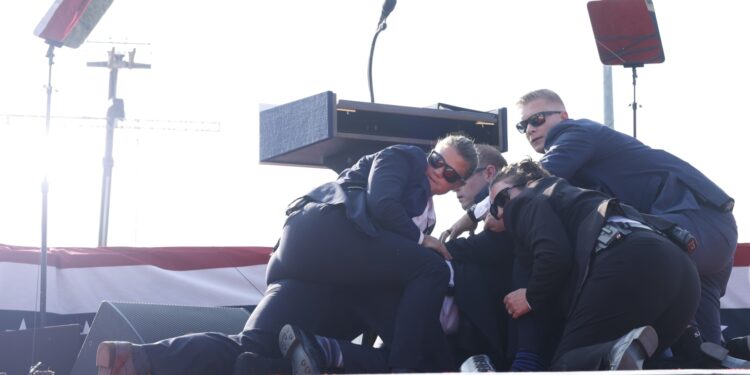A Secret Service investigation exposed new security breakdowns leading up to the assassination attempt on Donald Trump that critically injured two and killed one at a Pennsylvania campaign rally in July.
According to senior government officials, who spoke to the Washington Post on the condition of anonymity, the probe noted that agents from Secret Service headquarters and the Pittsburgh field office had a insufficient strategy to block a clear sight of the former president at the July 13 event. The internal investigation also found that agents never instructed local police to secure the roof used by the gunman Thomas Matthew Crooks.
Sources added that, although agents tasked with securing the rally discussed potentially using heavy equipment and flags to block the line of sight between the building used by Crooks and the event stage, supervisors found these measures were not deployed successfully.
The details of the internal review, according to the Post, may be released to the public next week.
On Thursday, acting director of the Secret Service Ron Rowe shared a summary of findings to the Senate Homeland Security Committee and a House investigative task force. He allegedly told lawmakers that he already ordered multiple changes in security plans to address the noted issues, including a protocol that places Secret Service agents and local police in the same command center for public appearances of presidential candidates.
Following the closed-door meeting, Sen. Richard Blumenthal (D-CT) told Fox News “I think the American people are going to be shocked, astonished, and appalled by what we will report to them about the failures by the Secret Service in this assassination attempt on the former president.”
Rowe acknowledged that the report found numerous errors for which the Secret Service should be held responsible, but that improvements and solutions would cost money.
“The Secret Service cannot operate under the paradox of ‘zero fail mission’ while also making our special agents and uniformed division officers execute a very critical national security mission by doing more with less,” he said in a statement.
The agency’s investigation echoes findings of the FBI’s Butler Investigation which detailed a myriad of weaknesses, notably in the agency’s communication system including that alerts by local police about a suspicious man at the rally prior to Trump’s arrival were not broadcasted adequately on Secret Service radio.
Feds also revealed that the agency was slow to bolster Trump’s security, despite having obtained information about an Iranian state plot to kill or harm political candidates.
Several senior Secret Service agents have announced their retirements ahead of the public release of the internal probe including Mike Plati, assistant director of the Office of Protective Operations, and John Buckley, a senior executive who helps delegate assets used to secure public events. Sources also claim that a senior agent in the Pittsburgh field office, which created the security plan, hinted at his plan to retire.







